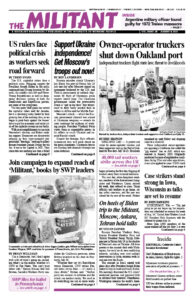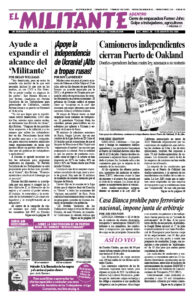Sixty-nine years ago on July 26, Fidel Castro and 160 fellow revolutionaries carried out armed attacks on the Fulgencio Batista regime’s Moncada garrison in Santiago de Cuba and the Carlos Manuel de Céspedes garrison in Bayamo, launching the war that toppled the U.S.-backed dictatorship in 1959 and opened the door for workers and farmers in Cuba to make the first socialist revolution in the Americas.
Cuba’s toilers showed that the exploited classes are capable of fighting to replace capitalist rule with something better — our own government. Their example is a mighty beacon to working people today, amid growing assaults on our jobs, working and living conditions, as well as deadly wars, like Moscow’s invasion of Ukraine, that threaten to engulf the lives of millions.
The attack on the garrisons were defeated. Fifty-six of the combatants who were imprisoned were murdered by the military, and Castro was put on trial and jailed. His courtroom speech, History Will Absolve Me, was smuggled out of prison and widely circulated to explain the revolution’s goals and recruit.
“When we speak of the people, we are not referring to the wealthy,” Castro said, but the unemployed, farmworkers, industrial workers, small farmers and other toilers, “those who know misfortune and are therefore capable of fighting with limitless courage!” To these people “the revolutionary movement is not going to say ‘We will give you everything…’ but rather: ‘Here it is, now fight for it with everything you have.’”
A mass amnesty campaign won Castro’s release.
He organized the next steps in the revolutionary struggle, forming what became the Rebel Army, which took on Batista’s forces. As they won over the exploited peasants and conquered territory, they began implementing the program Castro had outlined in History Will Absolve Me, organizing working people to take charge of health care, education, revolutionary courts, construction and a sweeping land reform.
To the great horror of the imperialist masters in Washington, the revolutionary government that came to power in 1959 did carry that program through to the end. Castro and the July 26 Movement led workers and farmers to replace all the institutions of capitalist rule, take power into their own hands, and use their government to make deeper and deeper inroads against capitalist exploitation and property relations, and assert the socialist character of their accomplishments. The toilers embraced the Marxist character of their leadership.
Hundreds of thousands volunteered for literacy brigades, the newly formed Federation of Cuban Women, their own military defense forces and other steps to expand and defend their revolution. A deep transformation in the consciousness and confidence of working people unfolded.
Workers and farmers in Cuba earned the implacable hatred of the U.S. capitalist class. Ever since, Democratic and Republican administrations alike have tried to crush Cuba’s socialist revolution and its example. Join the fight to end the brutal U.S. economic war on the Cuban people and, most importantly, to build a working-class party to lead the millions of exploited and oppressed in the U.S. to emulate their example.

